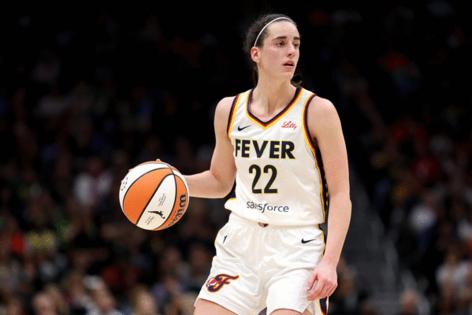Sue Bird says Caitlin Clark backlash may have started with Diana Taurasi's 'reality is coming' comment
Published in Basketball
Caitlin Clark’s rookie season in the WNBA has come to a close, and it’s safe to say that few athletes have experienced the intensity of both adulation and criticism that she did in her first year as a pro.
Former UConn star and WNBA legend Sue Bird spoke about Clark, and the various narratives that have emerged surrounding her on both social and traditional media, on her podcast, ‘A Touch More’ with partner Megan Rapinoe.
Bird said she believes the narrative that WNBA players were jealous of Clark and out to get her may have begun after former UConn teammate Diana Taurasi answered a question from ESPN’s Scott Van Pelt about rookies adjusting to the WNBA after The Bird & Taurasi Show, which aired during the Women’s Final Four in April.
“Look, SVP. Reality is coming,” Taurasi said back in April. “There’s levels to this thing. And that’s just life, we all went through it. … You look superhuman playing against 18-year-olds, but you’re going to come with some grown women that have been playing professional basketball for a long time. Not saying that it’s not going to translate, because when you’re great at what you do, you’re just going to get better. But there is going to be a transition period, where you’re just going to have to give yourself grace as a rookie, and it might take a little bit longer for some people.”
Bird said she believes that after Taurasi’s comments went viral, it opened the door for narratives to be created and hateful comments to begin being spewed.
“Once Diana’s comments went viral, it led to the Twitter trolls and bots taking over, and what started there was this narrative of petty, jealous players hating on Caitlin. That’s really what happened, that’s where it started. That we must just dislike her, that we look at her side-eyed, that we don’t want her to come into the WNBA and that we’re hating on her. So we’re petty and we’re jealous. And from there, when we get to the WNBA season, this is already implanted in people’s heads. It already exists,” Bird said.
“Diana has been so complimentary of Caitlin since, which to me just really speaks to the issue, which is, at times, people have been negative towards some of these rookies, from a basketball standpoint. And yet those statements have been just blanket statements on how an entire group of people feel.”
Bird said she believes a faction of fans began to criticize WNBA players for targeting Clark and trying to intimidate her. Incidents such as Chennedy Carter’s flagrant foul on Clark and Diamond DeShields’ takedown of her on a fast break were met with swift backlash from fans and media alike. Bird, however, disagrees with the notion that players were targeting Clark.
“Not at any point did I think anybody was playing dirty, not at any point did I think Catlin was targeted,” Bird said. “What happened was, these petty, jealousy narratives that got formed, then when the season started and people saw people blocking Caitlin’s shot or picking her up full-court, it then became, ‘Oh, they’re targeting her. They’re trying to hurt her.’ I cannot stress enough how insulting that is.”
“When I came into the league, I had a really good college career, I was on the scouting report, and everyone was picking me up full-court, everyone was playing me physical, and they were basically testing me out. Because you know what happens? If you don’t handle it, they’re going to keep doing it, because that is how you stop great players. When people are up in arms about Caitlin being picked up full court … well yeah, you have to, because if you don’t, she’s going to drop 35 on you. It’s called smart defense.
“But again, what happened was all these narratives got birthed through Twitter trolls. And then you had media members who don’t usually cover our league step into the space because Caitlin and Angel (Reese) and the rookie class brought a lot of new attention, they’re now in this space. And I don’t know if they’re only reading Twitter, I don’t know what their research was like. The way it came across was they did none. And they were just listening to all the narratives.”
You can listen to the full episode ‘A Touch More’ here, or on various podcast streaming platforms.
©2024 Hartford Courant. Visit courant.com. Distributed by Tribune Content Agency, LLC.







Comments